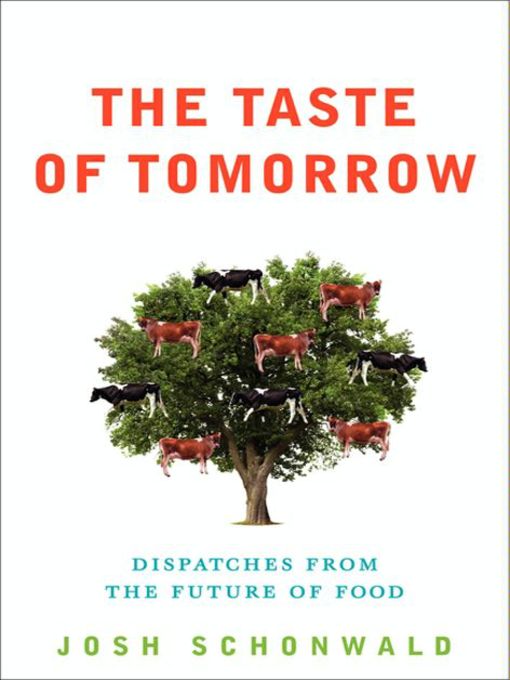
The Taste of Tomorrow
Dispatches from the Future of Food
کتاب های مرتبط
- اطلاعات
- نقد و بررسی
- دیدگاه کاربران
نقد و بررسی

December 12, 2011
In search of what people will be probably be eating in 2035, Chicago food writer Schonwald considered sustainability and taste in unearthing some far-out gastronomic trends, from salad weeds to warehoused fish. In this easygoing, evenhandedly researched account, he takes the reader through his discoveries: in Salinas, Calif., the capital of America’s salad bowl, he gleans new possibilities for nutrient-rich bagged greens, from radicchio to such motley weeds as purslane (Gandhi’s favorite vegetable) and thistle; an in vitro meat lab in Utrecht, Netherlands, attempts to come up with RMD (a red meat alternative) that does not emit greenhouse gases, pack saturated fats, and carry diseases; while in Saltville, Va., aka Fish City, USA, the perfect saltwater fish—cobia—is happily grown in a landlocked warehouse that aims to capture its own gas emissions as well as help jump-start a domestic seafood industry closer to consumers. (An alarming 90% of the seafood in the U.S. is imported.) Schonwald surprised himself by adjusting his opinion of genetically modified foods, aka Frankenfood, by visiting geneticist Pamela Ronald’s plant lab at UC Davis, for example, which develops foods resistant to disease and rich in nutrients that can help feed the Third World. In his candid, sensible survey, Schonwald weighs carefully the pros and cons of our well-intentioned, but often blindsided “foodie fundamentalism.”

March 1, 2012
What will be featured on restaurant menus in 2035? In his examination of food trends of the future, journalist Schonwald discovers a fascinating array of characters and an unpredictable set of conclusions. He begins with the vibrant world of greens, particularly salad greens, and pursues a cross-continental search for the next big salad ingredient, a journey that takes him from his local Illinois farmer's market to California's "Salad Bowl." While conducting research, the author began to realized that "many of the ideas of the foodie mainstream are dangerously myopic, potentially destructive, and possibly the source of widespread blindness in Southeast Asia." Describing his own then-radical experience of eating bagged salad mix in the late 1990s and his resulting abstinence from iceberg lettuce, Schonwald displays a gleeful obsession with heirloom varieties of radicchio, deep interest in the "weedy" greens grown on Alice Waters' farm and childlike delight in rooting his own eating in the realities of seasonal availability. The author tackles an admittedly self-selected set of potential food trends, including "the next salmon" (cobia), healthier meats and the next big trend in ethnic food. Along the way, Schonwald comes to the conclusion that the future of food trends is actually a question about the future of the earth's ecological integrity, leading him to explore and largely embrace the possibilities of genetically engineered foods. The author effectively pairs his personal experiences with significant research, interviews and lively anecdotes. An articulate food book that has an opinion without being preachy and that exudes a joy about food without being oversimplified.
COPYRIGHT(2012) Kirkus Reviews, ALL RIGHTS RESERVED.

November 1, 2011
From Alice Waters's microfarm to bioengineering and nanotechnology--seen by some as a way to eliminate hunger--Schonwald's book explores how we'll be eating tomorrow. Not one to see bioengineered food as a bad thing, Schonwald might be kicking up a bit of controversy here. Read with Tyler Cowen's An Economist Gets Lunch, this book should give you much, ahem, food for thought.
Copyright 2011 Library Journal, LLC Used with permission.

February 1, 2012
The breadth of Schonwald's approach may be symbolized by the website he edits; TheGreenFoodTechie.org strongly suggests one can be both green and a techie. Schonwald raves over discovering organic mixed greens after a lifetime of iceberg lettuce, but he also touts bioengineered papaya and recirculating aquaculture of tilapia and barramundi, and he urges that, if the earth is to feed its billions of residents in the twenty-first century, we need to be open to contributions from biotechnology and nanotechnology. The Taste of Tomorrow journeys through the menu, from Salad Days to meat and fish to ethnic options to the sorts of food substitutes the U.S. Department of Defense and nanotechnologists explore. His Meat section addresses exotic species like goat, emu, and rabbit and the potential for laboratory-grown meat; his Ethnic section sees great potential for African spices. Some readers may object that Schonwald fails to examine seriously potential harmto humans or to land, water, and airfrom bioengineered or nanotech foods, but they cannot complain about his enthusiastic exploration of a range of possible food futures.(Reprinted with permission of Booklist, copyright 2012, American Library Association.)

























دیدگاه کاربران